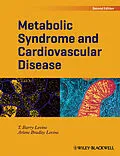Identify at-risk patients
Explain individual contributing factors
Aid in patient education and motivation
Direct comprehensive care and
Choose the most appropriate interventions
Comprehensively revised to reflect leading-edge research and now organized to facilitate easy access to essential information and clinically-relevant guidance , Metabolic Syndrome and Cardiovascular Disease, 2e offers this and more. Not only will you receive a solid understanding of the pathophysiology underlying the metabolic syndrome and cardiovascular disease but also the rationale for today's most effective treatments.
What's new?
Filled with timely new content, this updated edition covers:
New discoveries that have changed our understanding of the pathogenesis and interrelationship of metabolic syndrome, cardiovascular disease (CHD), and type 2 diabetes mellitus (DM)
The relevance of mitochondria and telomeres
Sleep and its impact on cardiometabolic health
The pivotal interplay between insulin and forkhead transcriptionfactors
Calorie restriction research
Bariatric surgery experiences and outcomes
In addition, each chapter includes essential information on comorbidities, interventions, and pharmacotherapeutic options – an exclusive feature found only in the second edition!
Autorentext
T. Barry Levine, MD, FACC, is Chief Medical Officer, A.B.L.E. Medical Consulting. He is Professor of Medicine at Drexel University College of Medicine in Philadelphia, PA. Dr. Levine is a Fellow of the American College of Cardiology, a member of the Scientific Advisory Board of the International Academy of Cardiology, and a board member of the Tracleer International Scientific Advisory Board. In addition, he is a member of the American Federation for Clinical Research, the American Heart Association, the International Society for Heart and Lung Transplantation, the American College of Chest Physicians, and the Heart Failure Society of America. Dr. Levine has been recognized by his peers in "Best Doctors in America" and "Top Docs in Pittsburgh". Dr. Levine has participated in numerous clinical trials, authored many articles (138), and created a variety of media presentations on heart failure, hypertension, dyslipidemia, and metabolic syndrome. He along with Dr. Arlene B. Levine has written "A Patient's Guide to Heart Failure" and has authored a textbook, "Metabolic Syndrome and Cardiovascular Disease".
Arlene Bradley Levine, MD, FACC, is CEO, A.B.L.E. Medical Consulting. She is Assistant Professor of Medicine at Michigan State University and? is board-certified in Internal Medicine and Cardiovascular Disease. Dr. Levine is a Fellow of the American College of Cardiology. She is a member of the American Heart Association, the International Society for Heart and Lung Transplantation, the American College of Chest Physicians, and the Heart Failure Society of America. Dr. Levine has authored 45 articles, and has been recognized by her peers in "Best Doctors in America" and "Top Docs in Pittsburgh".
Inhalt
Preface viii
List of Abbreviations ix
1 The Metabolic Syndrome: A Relevant Concept? 1
2 Mitochondria 3
Background 3
Cellular respiration 6
Modulation of mitochondrial metabolic activity 9
Factors that affect mitochondrial number and activity 10
Peroxisome proliferatoractivated receptor gamma coactivator-1 11
Mitochondrial production of prooxidant species 12
Mitochondria and nitric oxide 15
Mitochondrial calcium homeostasis 17
The mitochondrial permeability transition 18
Apoptosis 22
Causes for mitochondrial dysfunction 22
Implications of mitochondrial dysfunction 27
Mitochondrial dysfunction and cardiovascular disease 27
Mitochondrial dysfunction and metabolic disease 29
Conclusion 32
Bibliography 34
3 Telomeres 40
Telomere structure 40
Telomere function 41
Telomere shortening 41
Telomere dysfunction 42
Physiologic age 42
Gender differences 43
Telomerase 43
Cell senescence and apoptosis 46
Telomeres in aging 49
Risk factors for cardiometabolic disease 51
Telomeres senescence and chronic disease 54
Cardiovascular disease 54
Insulin resistance and type 2 DM 57
Conclusion 58
Bibliography 60
4 The FoxO Transcription Factors and Sirtuins 64
Forkhead transcription factors 64
Functions of FoxO 68
Cardiovascular forkhead effects 70
Metabolic forkhead effects 72
Histone acetylation and deacetylation 75
Sirtuin deacetylases 76
Sirtuin regulation 78
Antiinflammatory cardiovascular and myocyte sirtuin effects 80
Sirtuin effects on metabolism 81
Sirtuins and cell longevity 83
Forkhead deregulation and insulin resistance 85
Paradoxical effect of nutrition versus stress on cell death suppression 87
Conclusion 89
Bibliography 90
5 Insulin and Insulin-Like Growth Factor 96
Anabolism and catabolism 96
Control of plasma glucose 96
Insulin 97
Insulin receptor location 98
Metabolic insulin signaling 101
Insulin-mediated glucose uptake 103
Nutrient storage and metabolism 104
Vascular and antiinflammatory effects 106
Mitogenic action 107
Insulin-like growth factor 108
Insulin and IGF impact on cell longevity 111
Amylin 113
Glucagon 113
Conclusion 113
Bibliography 114
6 Oxidative Stress 120
Free radicals 120
Oxidases 120
Sources for free radicals 123
Endogenous antioxidants 124
Physiologic functions of oxidative stress 126
Mechanisms of oxidative damage 127
Cellular stress-sensitive pathways 127
Cellular targets of oxidative stress 128
Oxidative stress-related diseases 129
Endothelial dysfunction with oxidative stress 129
Cardiovascular disease 130
Insulin resistance and type 2 DM 131
Conclusion 133
Bibliography 134
7 Mental Stress 139
Stress responses 139
Central stress pathways 139
Peripheral stress pathways 140
Fight-flight-fright responses to acute stress 142
Sequelae of sustained passive stress 142
Inflammatory effects of stress pathways 143
Vascular and lipoprotein effects of
stress pathways 143
Stress impact on body weight 146
Metabolic effects of stress pathways 146
Depressio...
